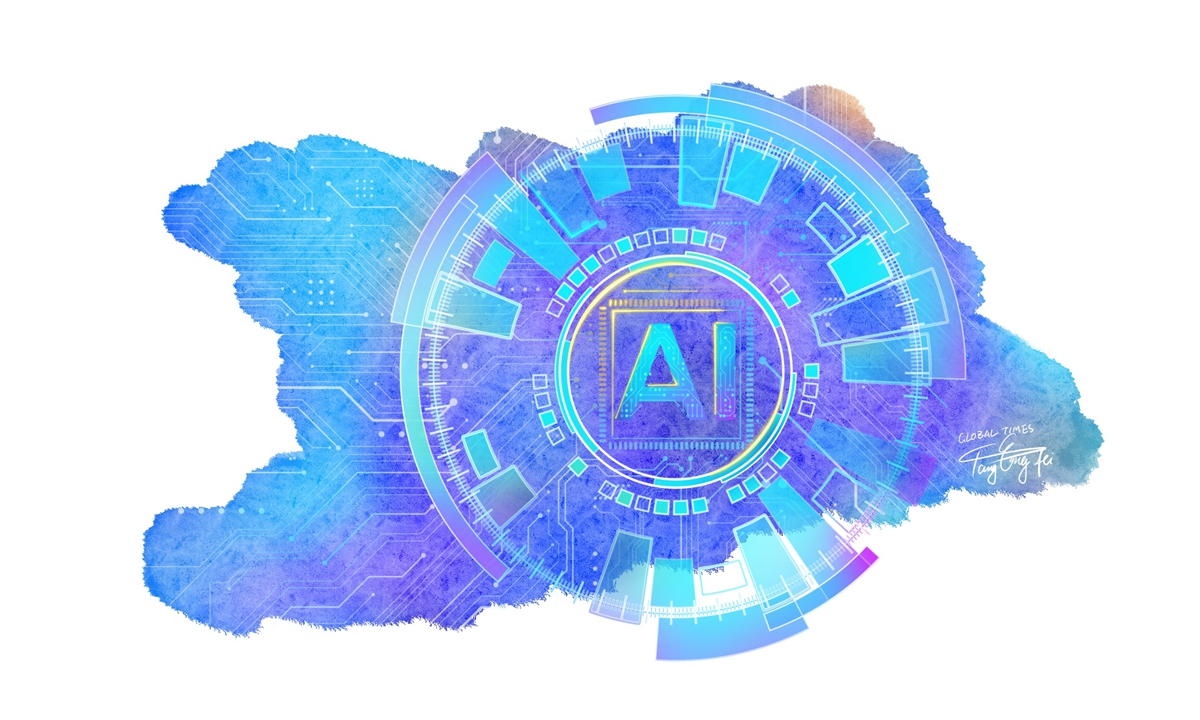
Illustration: Tang Tengfei/Global Times
The leadership crisis that engulfed OpenAI for nearly a week may have settled for the moment with Sam Altman's return as CEO, but the public controversy over the corporate power struggle hasn't diminished, with analysts saying the case may have untold ripple effects for AI development for years to come.
A power struggle within a company has rarely attracted such strong global attention. Although many specifics regarding OpenAI's leadership crisis are still unclear, the public has noticed that two individuals at the center of the storm - Sam Altman and chief scientist Ilya Sutskever - have different understandings of the AI sector's development. Altman was a prominent figure in the company's business division, actively seeking ways to broaden business prospects. The OpenAI chief scientist, however, is known for his growing concerns about AI safety and ethics.
Ahead of OpenAI's firing of Altman, several staff researchers wrote a letter to the board of directors warning of a powerful AI discovery that they said could threaten humanity, two people familiar with the matter told Reuters. This has been considered by some analysts as the dynamite that set off OpenAI's power struggle. No matter whether it's true or not, this fueled a discussion about the future and destiny of AI.
The reason why the company's internal power struggle can send shockwaves worldwide and draw intense discussion is people's deep fear about the long-term potential risks of AI. The world's focus on OpenAI's power struggle reflects, to some extent, increasing concerns over one question: should AI development prioritize safety and ethics, or speed and profitability?
The answer to this question may be related to the future of human society, and it cannot be determined by a company's internal power struggles. AI is a new frontier of human development. Currently, a new generation of AI is booming around the world, injecting new momentum into economic and social development, and profoundly changing people's productivity and lives.
It comes with major opportunities and also hard-to-predict risks and challenges that require a global response. OpenAI's case again proved the necessity and urgency of strengthening AI governance and establishing governance frameworks based on broad consensus among all parties.
It is well known that capital has inherent profit-seeking and risk-taking tendencies. It may be not much of a surprise if a company prioritizes its business interests.
OpenAI has been at the forefront of global AI development and has brought global AI development to a new level. From this perspective, the company deserves close attention, but this does not mean the world should trust it to determine the direction of AI development.
OpenAI has the right to choose its own destiny and leaders, but global AI development should be determined by all relevant parties, not capitalists in Silicon Valley and Wall Street, or any single country, company or individual.
The governance of AI, a common task faced by all countries, bears on the future of humanity. China launched in October the Global AI Governance Initiative, offering an open, inclusive and fair approach for the development, security and governance of emerging AI technologies and services, in stark contrast with some countries' restrictions and blockades aimed at preserving hegemony.
China's Foreign Ministry spokesperson said that China supports efforts to develop AI governance frameworks, norms and standards based on broad consensus and with full respect for policies and practices among countries, and supports discussions within the United Nations framework to establish an international institution to govern AI.
As there's already a huge gap between the Global South and the Global North in terms of AI technology and services, the interests of developing countries should get more attention. It is believed that as more AI companies accelerate their development and become competitive with OpenAI, diversified development will form a healthier industry landscape, thereby promoting further development of the entire industry and reducing the impact caused by a company's internal chaos on the entire industry.
China's AI sector has developed at an unprecedented speed in recent years, with Chinese high-tech firms including Baidu rushing to deploy ChatGPT-like AI solutions. Chinese enterprises have developed an indispensable presence in the global AI industry. They should continue to speed up their pace of development and technological innovation, contributing actively to the diversified development of the global AI industry.
The author is a reporter with the Global Times. bizopinion@globaltimes.com.cn




